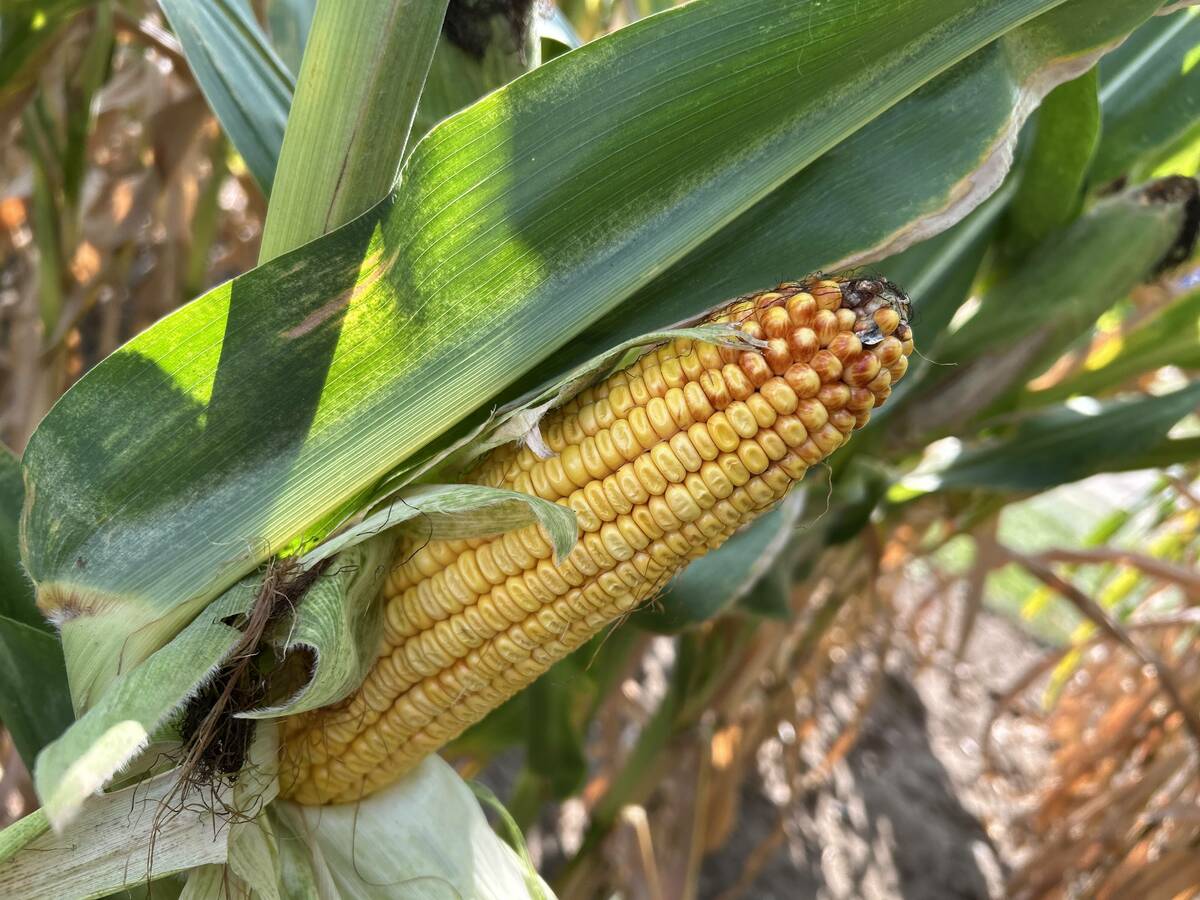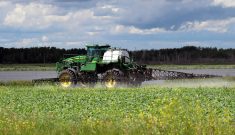Interest among women in a Saskatchewan technical school’s agricultural equipment program reaches an all-time high
Women who want to repair combines, tractors and sprayers continue to make their mark in Canadian agriculture and for the first time, Saskatchewan Polytechnic has five female apprentices at once attending classes in the agricultural equipment technician program in Saskatoon.
“This is remarkable and I think our program is way better for it,” said program head Chris Thomson, who remembers having few women in the trade not long ago.
“Our apprenticeship group is about 12 to 13 people and we’ve got nine of them in the building right now and out of that, five are women,” he said.
Read Also

Crop estimates show mixed results
Model-based estimates used by Statistics Canada showed the 2025/26 crop year has seen increases in canola, corn for grain, oats and lentils production while seeing dips in spring wheat, durum wheat, soybeans and barley in comparison to 2024/25.
According to Statistics Canada, between 2017 and 2021, the number of women supervisors and workers in technical positions increased by 19.4 percent. They are working in agriculture, natural resources and related production sectors.
Throughout the province, Saskatchewan Polytechnic has 18 registered female apprentices in the program, which provides theory, testing and hands-on experience for eight weeks per year during the four-year program.
Upon completion, students can write an exam to become a certified agriculture equipment technician.
Kelsey Zerr, 25, from Mankota, Sask., is in the final week of her fourth year. She grew up on a mixed grain and cattle operation and has been apprenticing at Wilson Ag Repair in Mazenod for the past four years.
Like many young farmers, she wanted the skills and ability to help out on the family operation.
“Honestly, so I could fix my own dad’s equipment without having to call somebody else. My sister is an agronomist and me being a mechanic, we can run our whole farm on our own,” she said.
“Dad thought it was great. He buys old machines that need a little tinkering, so he finds it fantastic.”
Zerr started training as a registered nurse but switched gears to pursue the second career on her bucket list and become an ag mechanic.
She sees similarities between nursing and mechanics.
“In nursing, you’re looking at symptoms to find some sort of illness. I worked a lot in long-term care, so this person is delirious and acting funny. Well, are they dehydrated? Do they need something?
“Here, you look at a symptom. OK, I’ve got hydraulics that don’t work in one way, but they work in another. OK, well, what goes to them? It’s finding common denominators to get to the problem that you’re seeing.”
Third-year apprentice Shania Krupa, 26, grew up in Wawota, Sask., and spent a lot of time at her uncle’s feedlot, where she enjoyed working with cattle and horses.
“When I was little, I don’t know why I took a shine to it. I just kind of wanted to do it,” she said of her desire to fix broken things.
Originally aiming at automotive mechanics, she decided to pursue agriculture instead after a summer job at an ag equipment manufacturer. She is now apprenticing at Rocky Mountain Equipment in Moosomin.
“The content’s really fun. We’re doing power trains right now, but I’d say electrical is my favourite,” she said.
Tanis Wickstrom, 21, is also a third-year apprentice.
She grew up in Medicine Hat, Alta., and worked at Rocky Mountain Equipment in the registered apprenticeship program during high school, where she quickly discovered her passion for mechanics.
“I was hooked ever since my first three months there. They let me split a tractor and I thought that was the coolest thing I’ve ever done,” said Wickstrom.
She’s been working at the Rocky Mountain Equipment dealership in Yorkton for three years.
“The highest satisfaction is probably seeing things that are wrecked because it’s super interesting. You get to see what caused that and then you repair it to look new.
“It’s pretty satisfying to see that you did that and you look at it and you’re like, ‘oh yeah, that’s pretty impressive of me because lots of people have no idea what’s going on there,’ ” she said.
“I’d rather not specialize in one thing, but right now I work on a lot of combines. I do like combines so that’s not an issue, but I’d like to know it all.”
Fourth-year apprentice Gabrielle Lavoie, 25, of Albertville, Sask., spent her childhood on the family’s cattle and grain farm and is working at Brandt Agriculture Equipment in Prince Albert.
After getting her 1A professional truck driver’s licence at 18, she decided she needed more education.
“I realized that if I broke down on the road, I didn’t know how to fix it. I got accepted into truck and transport heavy duty pre-employment and that’s (how I) started to like it, so just stuck with it after that,” she said.
“I’m pretty independent…Like, I can go live by myself and be able to switch an engine over to a different vehicle or anything like that.”
Courtney Wilkins, 26, grew up on a grain farm and is in the one-year pre-employment program at the polytechnic.
“I always liked helping Dad and being in the tractor with him and stuff. I guess that’s kind of where it came from, but I also just really liked working with my hands. That was a big part of it as well,” she said.
Wilkins is also a primary care paramedic who received training through Sask Polytech and continues to work part-time in Preece-ville, Sask.
“Some of the guys in my class were like, ‘oh, you went from fixing people to fixing machines?’ It’s not like that, it’s not the same, but I like them both. I like to wear many hats,” she said.
As part of the one-year pre-employment program, Wilkins will work at Young’s Equipment in Assiniboia, Sask., and hopes to eventually train full-time at the dealership.
“I’m going to do my work placement there and if that all goes well, then I’d like to apprentice there.”
Wilkins is the only woman in the pre-employment program and said working with male classmates is not an issue.
“I kind of assumed I was going to be the only girl but all the guys in my group are super nice and really helpful. And I just kind of feed back any attitude that they give me, so it all works out.”
While all five women acknowledge they are in a male-dominated field, they said gender has not been an issue. This is partly due to having a female teacher in the program as a mentor and role model, said Thomson.
“Having Emily (Messner) as a staff member here is hugely beneficial to us on many levels — not any reason for her to be singled out because she’s a female, but she’s just a very highly competent instructor,” he said.
“It’s how you relate to people. It’s the way you embrace the technology and the equipment you’re working on, or the component you’re talking about, or whatever.
“It’s about relating to that person’s personality and what they bring to the conversation about whatever you’re talking about.”
Messner grew up on a cattle and grain farm at Porcupine Plain, Sask., and has been teaching ag equipment for about a year.
Like many of the apprentices in the program, she has an ag background and there are several mechanics in the family.
“My grandpa and my dad were very mechanically inclined, so they fixed everything. We never had the dealership come out. I also have two brothers who are mechanics,” she said.
Messner went through the same program and worked at an agriculture dealership in Melfort, Sask., for five years before teaching.
“There’s a lot of learning every day, but I actually quite enjoy working with the students. I really like when there’s female students here because they react to me differently than the male students do for sure.
“I think that they enjoy my presence as an instructor. They’re definitely more open to me than the male students … as far as just asking questions or coming to me to ask for help or getting clarification on something they don’t understand.”
Added Thomson: “Temperaments are just temperaments. Everybody’s different. It has nothing to do with genetics or whether you’re male or female. It’s just a student temperament and I think we have an awesome student group. So we really appreciate everybody.”
















